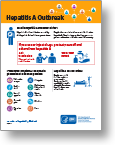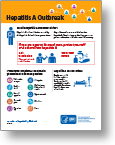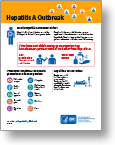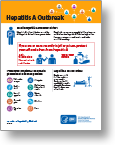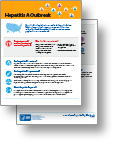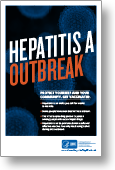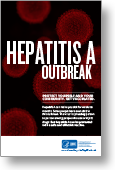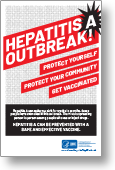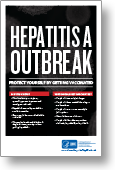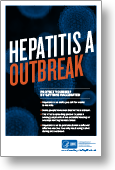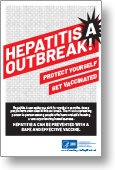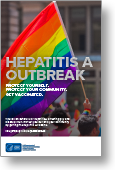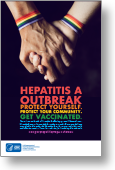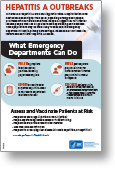
Person-to-person outbreaks of hepatitis A across the United States
When hearing about hepatitis A, many people think about contaminated food and water. However, in the United States, hepatitis A is more commonly spread from person to person. Since March 2017, CDC’s Division of Viral Hepatitis (DVH) has been assisting multiple state and local health departments with hepatitis A outbreaks, spread through person-to-person contact.
The hepatitis A vaccine is the best way to prevent hepatitis A virus (HAV) infection
- The following groups are at highest risk for acquiring HAV infection or developing serious complications from HAV infection in these outbreaks and should be offered the hepatitis A vaccine in order to prevent or control an outbreak:
- People who use drugs (injection or non-injection)
- People experiencing unstable housing or homelessness
- Men who have sex with men (MSM)
- People who are currently or were recently incarcerated
- People with chronic liver disease, including cirrhosis, hepatitis B, or hepatitis C
- One dose of single-antigen hepatitis A vaccine has been shown to control outbreaks of hepatitis A.1,2
- Pre-vaccination serologic testing is not required to administer hepatitis A vaccine. Vaccinations should not be postponed if vaccination history cannot be obtained or records are unavailable.
CDC has provided outbreak-specific considerations for hepatitis A vaccine administration and has updated its overall recommendations on the prevention of hepatitis A virus infection in the United States.
Since the outbreaks were first identified in 2016, 37 states have publicly reported the following through December 31, 2023:
- Cases: 44,926
- Hospitalizations: 27,457 (61%)
- Deaths: 424
NR: not publicly reported
- “Outbreak-associated” status is currently determined at the state level in accordance with each state’s respective outbreak case definition.
- Outbreak-related hepatitis A deaths are defined at the state level in accordance with each state’s respective hepatitis A-related death definition. Some states are reviewing death certificates on a regular basis to actively find hepatitis A-related deaths, while other states are utilizing passive surveillance.
- Outbreak start date is defined at the state level and may represent the earliest onset date of an outbreak case (AR, AZ, KS, UT), the left censor date for which cases are considered part of the outbreak based on the state outbreak case definition (AL, CA, CO, DE, FL, GA, ID, IL, IN, KY, LA, ME, MD, MA, MI, MN, MO, MS, NV, NH, NJ, NC, OH, PA, SC, TN, TX, VA, WA), or when a state declared a hepatitis A outbreak (NM, WV).
CDC’s Response
In response to all hepatitis outbreaks, CDC provides ongoing epidemiology and laboratory support as well as support on vaccine supply and vaccine policy development. When requested, CDC sends “disease detectives” to affected areas to evaluate and assist in an outbreak response. CDC alerts other public health jurisdictions of any increases in disease. All jurisdictions are encouraged to be watchful for increases in hepatitis A cases. CDC also works with state and local health officials to ensure hepatitis A vaccine is targeted to the correct at-risk populations and that supply is adequate.
Postexposure prophylaxis (PEP) is recommended for unvaccinated people who have been exposed to hepatitis A virus (HAV) in the last 2 weeks; those with evidence of previous vaccination do not require PEP.
PEP consists of:
- Hepatitis A vaccine for people aged ≥12 months
- Hepatitis A virus-specific immunoglobulin (IG) for specific populations
PEP Recommendations:
- ACIP Recommendations for Use of Hepatitis A Vaccine for Postexposure Prophylaxis and for Preexposure Prophylaxis for International Travel
- Supplement 1. Provider Guidance on Risk Assessment and Clinical Decision-making for Hepatitis A Postexposure Prophylaxis
NOTE: CDC recommends that all children be vaccinated against hepatitis A at age 1 year. Parents or caregivers who are unsure if a child has been vaccinated should consult the child’s health-care provider to confirm vaccination status.
- Outbreak-specific considerations for hepatitis A vaccine administration
- MMWR – The dose of GamaSTAN™ S/D has recently been changed
- Current Vaccine Shortages & Delays – Information on Vaccine Supply
- For Immunization Managers – Information on Vaccines Purchased with 317 Funds
- Hepatitis A hospitalization costs, United States, 2017. Emerg Infect Dis. 2020 May.
- Susceptibility to Hepatitis A Virus Infection in the United States, 2007-2016. Clin Infect Dis. 2020 Mar 20
- Hepatitis A Outbreak: What Clinicians Can Do [PDF – 1 MB]
- Medscape Commentary: Hepatitis A: Breaking Out All Over
- Archived webinar: Preventing and Controlling Hepatitis A in Jails and Prisons from the National Institute of Corrections, BOP and CDC
- HAN: Update: Outbreaks of Hepatitis A among People Who Use Drugs and People Experiencing Homelessness across the United States – March 2019
- COCA Call On-Demand Webinar for Clinicians: Hepatitis A Outbreaks in Multiple States – CDC Recommendations and Guidance – Nov. 2018
- HAN: Outbreak of Hepatitis A Virus (HAV) Infections among Persons Who Use Drugs and Persons Experiencing Homelessness – June 2018
- MMWR: Hepatitis A Virus Outbreaks Associated with Drug Use and Homelessness — California, Kentucky, Michigan, and Utah, 2017
- Posters on how to clean up and disinfect to help prevent spread of hepatitis A virus from Water Quality & Health Council
- Updated CSTE clinical case definition for acute viral hepatitis A
- CDC guidance on viral hepatitis surveillance and case management
- CDC training on hepatitis A serology
- Hepatitis A general FAQs for Health Professionals
CDC is developing educational materials to support the outbreak at the state and local levels. Most materials include an area where local information can be inserted. Your organization’s contact information can be typed into the blue colored rectangle. To upload your logo, click on the white space below the blue colored rectangle. In the pop-up box, select browse and upload a PDF version of your logo.
Pocket Cards

Outbreak hepatitis A Pocket Card – to localize with organization information and outlines who should get vaccinated and the symptoms of hepatitis A
English Spanish
These cards should be printed double-sided on business card templates that print six double-sided cards per page. Settings must be set to “Actual size” or “Custom Scale 100%” to ensure accurate alignment.

These cards should be printed double-sided on business card templates that print six double-sided cards per page. Settings must be set to “Actual size” or “Custom Scale 100%” to ensure accurate alignment.

If You’re Sick Pocket Card – to localize with information on where to go for medical care and the symptoms of hepatitis A
These cards should be printed double-sided on business card templates that print six double-sided cards per page. Settings must be set to “Actual size” or “Custom Scale 100%” to ensure accurate alignment.
Posters
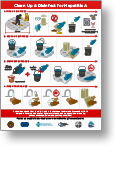
Posters on how to clean up and disinfect to help prevent spread of hepatitis A virus from Water Quality & Health Council
Digital Image
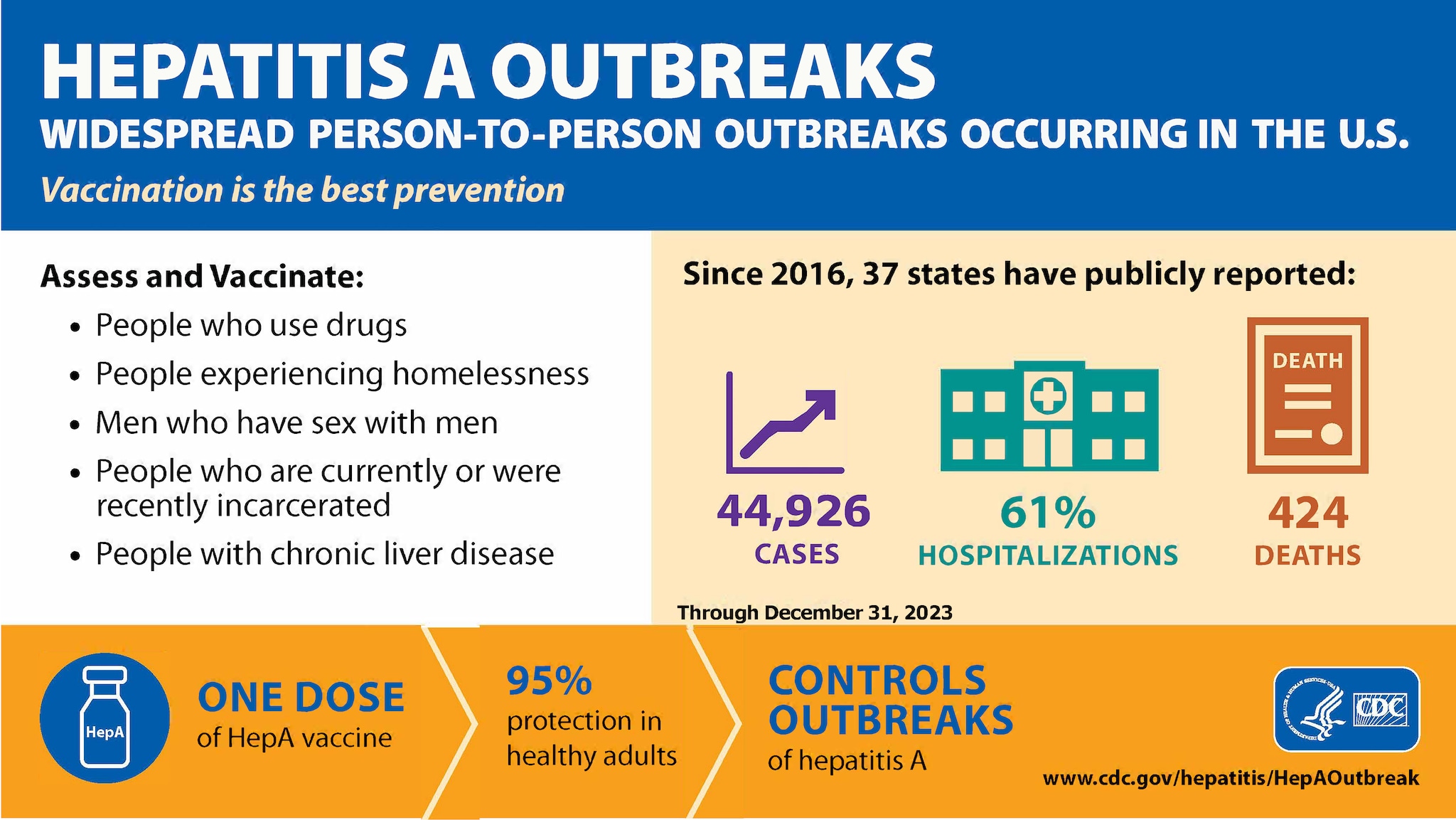
Information relating to the Hepatitis A Outbreak. To download the image, right-mouse-click on the link below and select the “save …” menu item to save the file to your own folder.
- Outbreaks of hepatitis A are occurring across the United States – Learn more about hepatitis A and the current outbreaks
- Hepatitis A outbreak FAQs
- Hepatitis A general FAQs for the Public
If you are a state or local health department with questions about outbreak investigation, management, and/or specimens, please email DVH staff.
If you are a practicing clinician with a concern about a potential case of hepatitis A virus infection, please contact your local or state health department.
For all other inquiries, please contact CDC-INFO at 800-CDC-INFO (800-232-4636), TTY: 888-232-6348 or Email CDC-INFO
- Ott JJ, Wiersma ST. Single-dose administration of inactivated hepatitis A vaccination in the context of hepatitis A vaccine recommendations. Int J Infect Dis. 2013 Nov;17(11):e939-44. doi: 10.1016/j.ijid.2013.04.012. Epub 2013 Jun 21. Review. PubMed PMID: 23791857.
- McMahon BJ, Beller M, Williams J, Schloss M, Tanttila H, Bulkow L. A program to control an outbreak of hepatitis A in Alaska by using an inactivated hepatitis A vaccine. Arch Pediatr Adolesc Med. 1996 Jul;150(7):733-9. PubMed PMID: 8673200.
